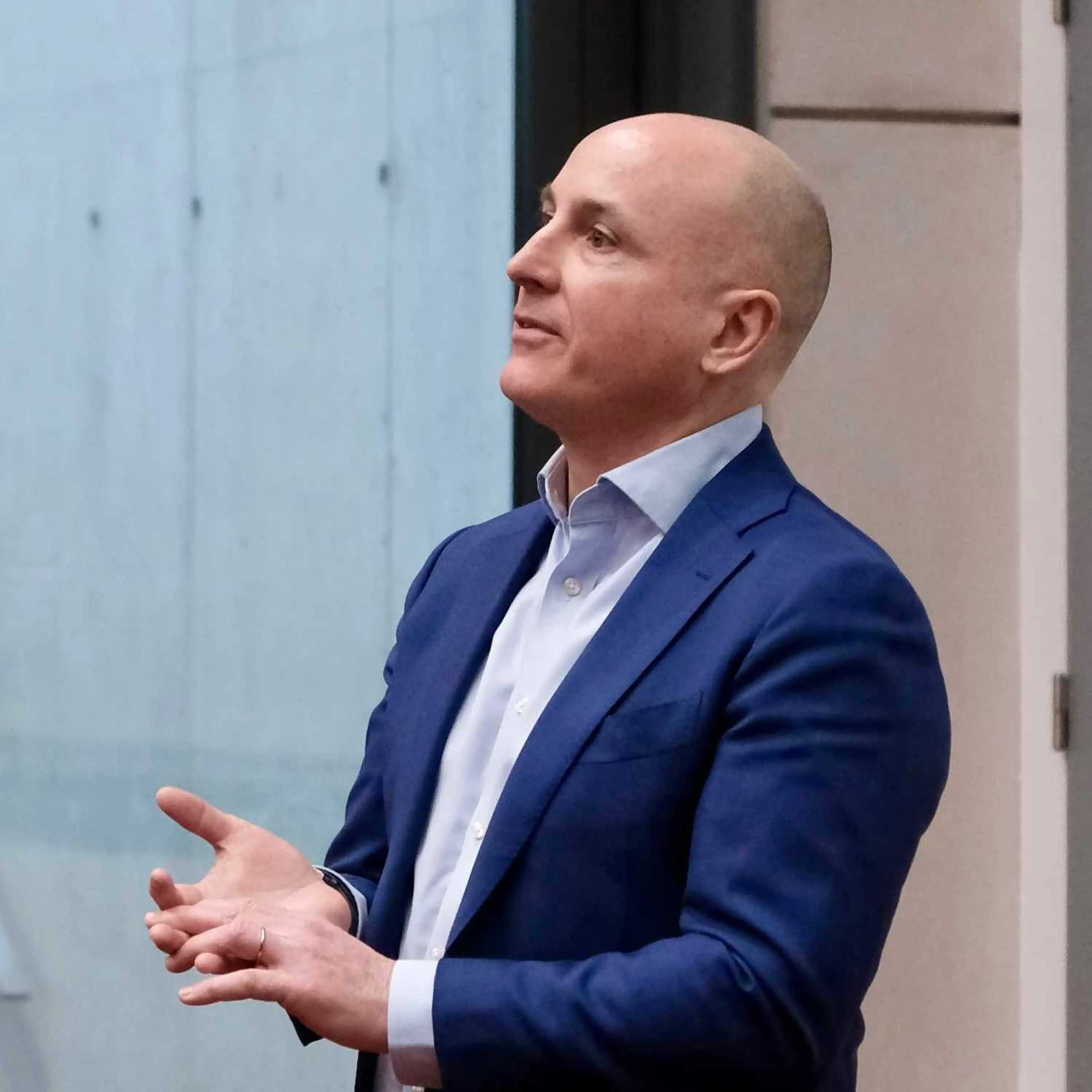CBS Associate Professor Kristjan Jespersen and Senior Director and Co-founder at Position Green Simon Taylor speak on the current state and future of ESG reporting. This interview was recorded at our event 'The end of ESG? Navigating the turbulent landscape' in March 2024.
ESG Dynamics – Balancing Principles and Responsible Finance
Kristjan Jespersen, a leading figure in sustainability, navigates ESG complexities at Copenhagen Business School and in corporate roles. Explore here insights on ESG's political entanglements, global challenges, and the imperative for nuanced approaches.
By CBS Executive Education"We are tasked to figure out how we will co-exist on this planet"
U.S. President Biden signed an executive order to address concerns surrounding the opposition to ESG principles which demonstrates the connection between policy decisions and societal repercussions. The executive order signifies a movement of the ongoing dialogue around ESG and signals a departure from a purely capitalist agenda while advocating for a more balanced and pragmatic approach. The intersection of ESG with partisan politics complicates the discourse, as evidenced by conservative and democratic lawmakers.
In drawing parallels with the Dr. Seuss’ book "On Beyond Zebra," Jespersen highlights the idea that we must think beyond conventional boundaries in understanding and implementing ESG principles.
“Dr. Seuss paints the notion that, as English speakers, our perception of the world ends after 26 letters. Comparatively, we have entered an era where there is much more to discover beyond what we already know, much like the series of imaginary letters in the book.”
ESG issues are controversial in both the US and global elections throughout 2024, posing challenges for businesses across the landscape. Amidst partisan division, companies are advised to carefully approach sustainability discussions and prepare for potential legal consequences related to greenwashing. At the same time, there is a growing emphasis on integrating ESG criteria into business strategies and increasing attention to biodiversity and nature-related investments following COP 28 agreements.
"What is happening in the U.S. reflects what is happening in Europe, even though many don’t see it that way because, one, we are unified in the European Union, and two, we only see the demographics of a specific sector reacting. For example, look at the farmers who are protesting across Europe right now."
Farmers across Europe have protested against issues like cheap supermarket prices and unfair competition, prompting EU agricultural ministers to discuss reforms in Brussels. These protests coincide with revisions to the EU's Green Deal policies and demands for fair revenue from farmers. Grievances include bureaucratic burdens, competition with non-EU imports, and calls for changes to the Common Agriculture Policy.
Kristjan Jespersen holds key positions in the sustainability space. At Copenhagen Business School he coordinates the ESG Minor programme, leads sustainability initiatives, and teaches sustainable innovation and entrepreneurship. Additionally, he contributes to carbon market innovation as an Advisory Board Member for CarbonClear and Solstroem.com. In the corporate space, he serves as the Chief Engagement Officer for a hedge fund in London.
Highlighting that ESG has the potential to lead to greater sustainability opportunities, but is not the solution to all societal problems, Jespersen says, “ESG must be structured rationally and there will be inevitable growing pains. I have some skepticism towards criticisms aimed at financial institutions like BlackRock and Vanguard, and others regarding their handling of ESG matters. To assume that, in our suspicion of failure of our democratic systems, a financial institution can fix everything is wrong.”
He asks to imagine why there would be an argument for the use of fossil fuels to demonstrate the nuance of sustainable solutions.
“Are there societies around the world that will still require some degree of fossil fuels to transport goods and services? For us to think ‘no’ is both short-lived and an incomplete understanding. We, as northern Europeans, feel quite confidently that our decision-making process can trickle down to the rest of the world. There are countries where lives are so critically dependent on non-sustainable energy sources.”
In Indonesia, for example, companies challenge conventional definitions of ESG by considering factors like regional employment diversity, which are specific to their socio-economic context.
Jespersen affirms that investments are moving in the right direction in terms of ESG factors, though the process poses many challenges. The evolution of responsible investment practices and the emerging trend towards curated portfolios with a clear focus on environmental impact is key. While interest in ESG investing is growing, many investors struggle to effectively integrate ESG factors into their investment processes. Professionals responsible for reporting, are feeling the pressure of upcoming reporting CSRD requirements, and those in the financial sector, are grappling with the task of curating and linking various data sources to derive intelligence under SFDR and address principal adverse indicators.
“Tension is great, but it is resulting in the curation of data and developing an understanding of alignment.”
Jespersen critiques the lack of standardisation in ESG methodologies, excessive focus on ratings, and the tendency for some companies to view ESG as a checkbox exercise rather than an integral part of strategy. He emphasises the critical importance of understanding the double materiality of ESG factors to each firm, aligning ESG goals with business strategy, and continuously monitoring for progress. Clarifying a shortcoming of ESG initiatives, he says:
“What has been our immense failure when it comes to protecting biodiversity? One, every project is a pilot project. Two, the firm's impact on biodiversity is never linked directly to their site and their intervention. You can’t destroy the planet over here and then do a little offsetting over there. Number three, we haven't figured out how to integrate the price of conservation, the price of responsibility, all the way down to the consumer. When I buy a Kit Kat bar, am I paying for Nestle's responsibility? Probably not, because the margins are tight but this will become part of the future under double materiality assessments.”
Jespersen sees potential for ESG, market, and satellite data to be combined to enrich these discussions.
As part of his research interest, he evaluates the role of management and elite boards on their competencies. A Harvard Business Review publication regarding a study of board members across the Standard and Poor’s 500 Index, focusing on individual E, S, or G indicators, research indicated a significant gap in ESG expertise among board members in the United States. This shortage of ESG proficiency was reaffirmed by MSCI's 2024 Sustainability Outlook, which identified artificial intelligence and ESG as key competencies sought after for board members in the coming years.
Board members are embracing education focused on material ESG topics, but Jespersen highlights that board education programmes lack the necessary nuance and focus, reflecting what is happening across the landscape. The deficiency in board competencies raise critical questions about the future readiness of leaders to navigate challenges such as reporting under the CSRD and steering their firms towards more sustainable practices.
“We are now seeing legal ramifications for firms neglecting their environmental and social responsibilities.”
Instances such as Shell directors facing personal lawsuits over climate strategy failures and the introduction of a duty of vigilance legislation in France exemplify this trend. The legal developments push the urgency for firms to not only understand their impacts but also to formulate strategies for remediation.
“Gone is the day when a leader can ignore anything, but they also cannot know everything. Let us rejoice in the fact that ESG has been present with us since 2005 and these growing pains are part of the inevitable.”
If you found this topic interesting, sign up via the form below to ensure you don't miss out on our next events.
Stay tuned for the next invitation, coming soon!


